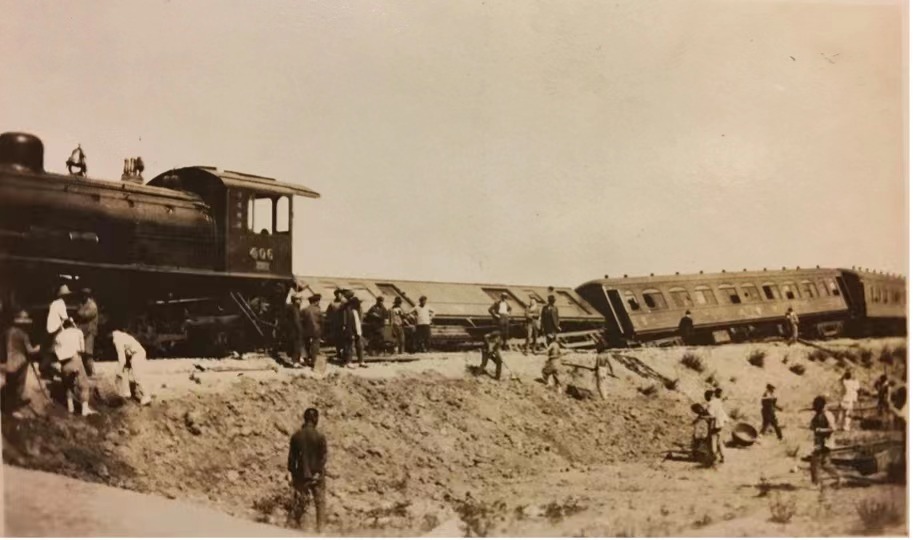
Nothing beats a bit of thriller, even moreso if it's a story that actually happened. Such is the case of 1923 Lincheng Train Incident, in which a warlord and his henchmen hijacked Asia's first all-steel passenger train and took over 300 hostages.
The story of the incident is documented in great detail in The Peking Express: The Bandits Who Stole a Train, Stunned the West, and Broke the Republic of China, a new account from 20+ year Beijing resident and four-term president of the American Chamber of Commerce James Zimmerman. Peking Express hurtles through 1920s China, complete with bandits, revolutionaries, and even a few foreigners, from the start of the incident all the way to it's gritty finale.

We caught up with Zimmerman in the middle of his global book tour to discuss his latest work.
How did you find out about the story that's at the heart of The Peking Express?
About seven years ago I was in the middle of another writing project about events in early 20th century China and came across several of the characters who were onboard the Peking Express. As I dug deeper and deeper, I became fascinated by how China’s great train robbery of 1923 had a significant impact on the Republic of China and its relationship with the world, yet the whole affair was largely forgotten in the fog of history. The Peking Express — and the people caught up in the affair — was a story that had been waiting to be told.
How difficult was the research? How much of it was done in Beijing?
My research and sleuthing around took me into government and university archives throughout China and around the world. On top of that, I spent much time tracking down the descendants of those that witnessed the affair — the hostages, rescuers, interlocutors, bandits, and fixers involved in the five-week hostage crisis. Many of the surviving descendants — in their 70s and 80s — had a great story to tell about how the crisis and the artifacts and documents they collected and passed on from generation to generation had become part of their family lore. I also spent much time in Zaozhuang (Tsaochuang), chasing ghosts and tracing the path taken by the bandits and hostages as they crossed the Shandong countryside, finding that much of the architecture and geological landscape remains the same today as it did in 1923.

Of course it's a thrilling story, but what was the biggest surprise for you?
As I reviewed the scores of never-before-published diaries of the incident, I began to learn that every character on board the Peking Express had their own unique and interesting story to tell. On the train that fateful night were, to name a few, a gilded-age heiress of the Rockefeller clan, two U.S. army officers and their families on holiday, sons of the highly regarded Shanghai Jewish merchants community, wealthy honeymooners on an around-the-world trip, the lawyer for the opium trade and other shady clients, and scores of newspaper correspondents chasing a good story, traveling salesmen chasing a buck, and the criminal elements chasing their next victim as they went from one port city to another to ply their wicked trades. The bandits themselves were a mixed bag of combustible elements, including ex-soldiers of fortune, drug addicts and starving peasants, and men who served in the China Labor Corps in Europe during the First World War. How such an interesting group of people found themselves on the same train on the same night crossing China’s vast countryside together surprised me as too coincidental — but it all sets the backdrop of the Peking Express story.
Are you planning another book? Can you tell us a bit about the next story?
I am writing a book about the first judge of the US Court for China — yes, there was such a thing — and how he was sent to Shanghai to rid the country of the Yankee riff-raff, murderers, drug dealers, gunrunners, prostitutes, card-hustlers, and thieves that had overrun China and were giving America a bad name. It’s like the wild-west where the good guys are sent out to clean up a lawless town beset by outlaws. It’s a people story and an interesting time period in China’s history.
If you'd like to find out more about the story from the author himself, you can catch James Zimmerman at the second installment of the Beijinger Book Group, which will be taking place on May 13 here in Beijing. To join the group, simply add TBJButler on WeChat (QR code below) and request to join.

In the meantime, you can pick up a copy of The Peking Express on JD, Taobao (search book title or author name), or in ebook format from Amazon.
READ: Travelers, Trains, and Tartary: China Literary Journeys to Inspire Your Next Adventure
Images courtesy of James Zimmerman

